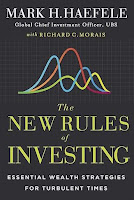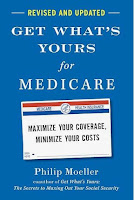Tuesday, June 17, 2025
Human Nature by Kate Marvel
Friday, April 4, 2025
Homestand by Will Bardenwerper
Monday, February 3, 2025
The New Rules of Investing by Mark Haefele
THE NEW RULES OF INVESTING by Mark Haefele with Richard C. Morais is subtitled “Essential Wealth Strategies for Turbulent Times.” Haefele is the global chief investment Officer at UBS where he oversees the investment policy and strategy for around $4 trillion in invested assets at UBS. In this book, Haefele stresses that “we must all change our way of investing to meet the needs of our time.” Advocating greater risk tolerance, he argues not for managing investments, but for managing wealth, and allocating your wealth by looking at Liquidity, Longevity, and Legacy. He also highlights the increasingly important role of government and even talks about 5Ds of disruption (debt, deglobalization, demographics, digitalization, and decarbonization). Haefele does offer limited advice on specific topics, like this excerpt on cryptocurrency which was featured in Barron’s. However, it would appear difficult for anyone to predict future actions, much less all unintended consequences, of the current administration. Instead, much of his text is a push for the strategies associated with the “UBS Wealth Way,” often told through client stories. Haefele also provides a varied list of other “books that shaped my thinking” and a lengthy bibliography (almost fifteen percent of the text). THE NEW RULES OF INVESTING offers an easy read, packed with anecdotes, more of a mindset reset than an investment guide. Contemplating the questions it raises could be helpful for readers prior to talking with their own financial advisors.
Saturday, October 26, 2024
New books: Social Security, Medicare, and Retirement
SOCIAL SECURITY 101 by Michele Cagan and Alfred Mill is the second edition of this self-proclaimed “Essential Primer on Government Retirement Aid.” Cagan is a CPA who writes often about finance investing and accounting and Mill has crafted several texts on finance and economics in this 101 series. They begin with some historical background and basics (e.g., getting a social security card; defining full retirement age). The next section looks at benefits – for individuals, children with disabilities, spouses and so forth. Later, timing of benefits is discussed as well as related issues about Medicare and retirement planning. Cagan and Mill offer numerous examples with specific amounts to help illustrate their points. This relatively short (240 pages) text provides an accessible overview and may serve as helpful prep before heading off to the Social Security office to review your own circumstances, an action highly recommended by the accountants, lawyers, and other advisors with whom I have consulted on this subject. Good luck getting an appointment, though; at latest check the wait was over 6 weeks.
GET WHAT'S YOURS FOR MEDICARE by Philip Moeller is subtitled “Maximize Your Coverage, Minimize Your Costs.” And although this is a revised and updated edition, it would still be difficult to cover this complex topic adequately in an up-to-date manner in a book. Better to consider this text as a very useful guide and to then turn to advisors who work regularly in this area. Granted, those individuals will tend to push people towards Advantage plans, but they can more thoroughly investigate individual situations and changing offerings. Also, get an idea yourself by using some of the online tools (e.g., comparing plans) available through Medicare.gov. Still, “boots on the ground” are quite helpful, be it friends and peers conducting their own investigations or nursing homes helping to publicize innovative, helpful plans for their residents. Moeller is a recognized authority in this area and has collaborated in the past with PBS NewsHour economics correspondent Paul Solman.
Moeller recently was interviewed on Morningstar's Long View, a podcast co-hosed by Christine Benz who in turn has written a recent book titled How to Retire: 20 Lessons for a Happy, Successful, and Wealthy Retirement. She has a companion How to Retire podcast on morningstar.
Wednesday, October 9, 2024
Beyond the Big Lie by Bill Adair
BEYOND THE BIG LIE is a new book by
Bill Adair, Pulitzer Prize winning journalist, creator of PolitiFact, and
professor at Duke University. He subtitles the text: “The Epidemic of Political
Lying, Why Republicans Do It More, and How It Could Burn Down Our Democracy.” Although
Publishers Weekly referred to some content as “overly partisan,” Adair
clearly believes in the importance of being truthful with the electorate and
outlines numerous examples of being less than truthful in a dozen chapters. The
text is very accessible, and he frequently refers to input from his college students.
One example is in the chapter called “Lying Hall of Fame” where students
nominated candidates like Big Tobacco, Exxon, Rupert Murdoch, Roger Ailes, and numerous
politicians from both parties as part of a research project. Adair points out
that political lying “crippled our discourse and made it impossible for us to
have a serious discussion on the vital issues of our day -- the climate crisis,
public health, or the future of Social Security and Medicare.” Adair also chronicles
the evolution of Mike Pence, a personal friend and neighbor of his when Pence
first served in Congress. In that chapter, Adair notes that “attitudes have
changed” and also quotes from an interview with Anthony Fauci: “there is no
shame in lying now. There is no shame in developing your own alternative facts --
untruth, conspiracy, lies have become normalized.” A final chapter explores “How
Can We Stop the Lying?” and Adair argues “research suggests there is fertile
ground for a citizen movement to hold politicians accountable for lying, …. I
believe politicians will respond if enough people speak up.” Sigh, people need
models – AARP has published candidate responses to their questions with no fact-checking at
all (“We allowed the candidates to present their views and positions without
commenting on the accuracy of their claims.”) BEYOND THE BIG LIE is an intriguing,
if disturbing, read. Roughly twenty percent is devoted to Notes, a list of Sources
(from over four years of interviews), a Selected Bibliography, and an Index.
Tuesday, September 17, 2024
Devil in the Stack by Andrew Smith
DEVIL IN THE STACK by Andrew Smith is subtitled “Searching for the Soul of the New Machine.” This text received a starred review from both Booklist and Publishers Weekly, but I initially found it very difficult to read. The prologue discusses coding and shares some firsthand experiences but does little to scaffold content for the remainder of the text. The author’s intent and main argument were not outlined, although he did comment: “from certain angles, life could appear to be getting worse in eerie proportion to the amount of code streaming into it” and “the software being written by a remote community of coders was reshaping society more dramatically than any technology since the steam engine.” I read further and liked learning about resources like freeCodeCamp, but struggled to embrace Smith’s writing style, jumping from one, albeit interesting, interview or interaction with an expert to another. I think he was trying to tie loosely related ideas together, perhaps like Mary Roach, but her work is more accessible and more entertaining. The Times Literary Supplement review recently described DEVIL IN THE STACK as “dense, prickly and rewarding” – give it a try and decide for yourself.
Sunday, September 15, 2024
The Mind's Mirror by Daniela Rus and Gregory Mone
THE MIND'S MIRROR by Daniela Rus and Gregory Mone (The Chip and the Heart) is another collaboration between a pioneering roboticist who is director of MIT's Computer Science and Artificial Intelligence Laboratory and a professional science writer. Their newest book focuses on “Risk and Reward in the Age of AI.” As ever, these two authors are extremely optimistic about the new technology and divide their text into three main sections: Powers, Fundamentals, and Stewardship. Taking a “hands-on” approach, they offer advice like: “as you evaluate how AI can help your business, I'd suggest breaking down the various roles within your organization by task, then looking at whether AI can assist, augment, or automate those tasks.” The authors also point to the value of “business bilinguals, [those] who understand both tasks and technology” like understanding the complex issues involved with medical coding and AI application. About halfway through the text they offer a section which reads a bit like a business school case with “a detailed set of guidelines and questions to consider as you think about putting AI into action.” Later, they do turn to potential concerns and link to an effort to provide policy briefs on the governance of AI. They also devote considerable space to less commonly cited challenges in three spheres: technical (such as training data, complexity, security, reliability, bias), societal (like privacy, intellectual property, controls, overreliance, misinformation), and economic (impact on jobs, the rate of adoption, and so forth). THE MIND'S MIRROR is a relatively accessible text which could prompt numerous discussions, whether for student researchers or business applications. The two-part appendix provides a brief history of artificial intelligence plus an overview of the infrastructure of AI, followed by suggestions for further reading and a bibliography of sources.
Friday, September 13, 2024
On the Edge by Nate Silver
Welcome to Continuing the Conversation!
We are in the midst of migrating book reviews to this new blog. To see past reveiws and comments, please visit Book Talk ... A Conversation...
-
I CHEERFULLY REFUSE by Leif Enger has a beautiful, eye-catching cover which reflects the many layers involved in this latest story from an ...
-
GROUNDS FOR MURDER by Betty Ternier Daniels is a debut mystery in the Jeannie Wolfert-Lang series. I am grateful for the free preview copy ...
-
THE ENGLISH MASTERPIECE by Katherine Reay is described by the publisher as “perfect for fans of Kate Quinn and Ariel Lawhon .” Given that ...











